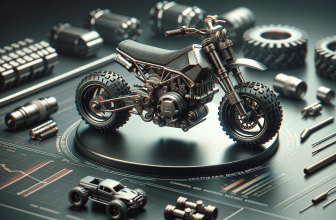
How often do you think about the tires on your vehicle? You probably know they’re vital for safety and performance, but for many people, tires only become a focus when they fail to deliver, especially during inclement weather. Anyone who has ever driven in a downpour understands that the right tires can mean the difference between arriving safely and finding yourself in a hazardous situation. But with so many options out there, how do you know which ones to trust when the rain starts to fall?
Our Top Picks
Our #1 Top Pick: Michelin Pilot Sport 4S
Regarded by many as one of the best wet-weather tires on the market, the Michelin Pilot Sport 4S excels in a variety of rainy conditions. Developed with high-performance vehicles in mind, this tire offers superb handling and wet road grip, thanks to Michelin’s Helio+ Technology, which includes a special rubber compound designed for excellent performance even on wet roads. The hydroplaning resistance is top-notch, allowing you to maintain control even in heavy rain. Owners of sports cars and high-end sedans will find the Pilot Sport 4S to be a perfect blend of safety, performance, and durability.
Pick #2: Continental ExtremeContact DWS06
For drivers who experience a range of weather conditions, Continental’s ExtremeContact DWS06 is a stellar choice. The DWS in the name stands for Dry, Wet, and Snow, indicating that this all-season tire is designed to handle adverse weather conditions with ease. It boasts QuickView Indicators, which help drivers understand the tire’s optimal performance environments. With a great balance of wet traction, responsive handling, and solid braking capabilities, this tire fortifies your confidence on rain-soaked roads.
Pick #3: Goodyear Assurance WeatherReady
Goodyear delivers with the Assurance WeatherReady tire, built to handle the worst Mother Nature can throw at you. It is an all-season tire that truly shines in wet conditions, featuring Goodyear’s Weather Reactive Technology which adapts to varying weather conditions. With Evolving Traction Grooves, the tire maintains its ability to channel water away effectively, reducing the risk of hydroplaning. Those looking for peace of mind throughout every season, particularly in areas prone to heavy rainfall, will appreciate the Assurance WeatherReady.
Pick #4: Bridgestone Turanza QuietTrack
The Bridgestone Turanza QuietTrack is designed not only for wet traction but also for comfort. Ideal for drivers who prioritize a quiet and smooth ride, the QuietTrack features Bridgestone’s latest In-Channel Stabilizer Grooves that minimize road noise while maximizing water evacuation. The tire’s wet-weather capabilities are enhanced by the hydroplaning resistance that keeps your vehicle stable and secure even when the rain pours.
Pick #5: Pirelli Cinturato P7 All Season Plus
Striking a balance between longevity, performance, and wet-weather capability, the Pirelli Cinturato P7 All Season Plus excels in delivering a quiet and fuel-efficient ride. It’s a tire that does well in both light and heavy rain thanks to its optimized tread pattern, which enhances water expulsion and reduces the risk of hydroplaning. Drivers interested in an eco-friendly tire that doesn’t compromise on safety and performance in wet conditions will find the P7 a worthy investment.
What to Know Before You Buy
Understanding a few key points about tires designed for wet conditions can ensure that you make an informed purchase that suits your needs and driving habits:
- Tread Pattern: Tires with a directional tread pattern are generally considered superior for wet conditions because they effectively channel water away from the tire’s footprint, reducing the risk of hydroplaning.
- Rubber Compounds: Soft rubber compounds tend to provide better traction on wet roads. Look for tires that have a high silica content for enhanced wet grip.
- Tire’s Age: Tires degrade over time, even if not used. Older tires can lose their effectiveness in wet conditions. Always check the tire’s manufacture date.
- Speed Ratings: A higher speed rating might indicate better handling and wet-weather performance, but it also typically means a shorter tread life.
- Hydroplaning Resistance: This is how well a tire can prevent hydroplaning, a dangerous condition where a layer of water builds between the wheels of the vehicle and the road leading to a loss of traction. Good wet-weather tires offer features to combat this.
Factors to Consider Before Buying
When shopping for the best tires for rain, several factors will guide your decision:
- Climate: Consider your local weather patterns. If you live in an area that experiences frequent rain, investing in a tire specifically designed for wet conditions is crucial.
- Vehicular Compatibility: Ensure the tires you choose are suitable for your vehicle in terms of size, load index, and speed rating.
- Driving Style: Your preferred driving style – whether you’re a conservative driver or someone who enjoys performance driving – will influence the type of tire that best suits your needs.
- Warranty: Look into the warranty of the tires. Tires that come with a good tread life warranty can provide additional peace of mind and value for money.
- Brand Reputation and Reviews: Buy from reputable manufacturers and read reviews from other users, which can provide real-world insights into the tires’ performance in wet conditions.
Why Trust ChooseRight?
Here at ChooseRight, our mission is straightforward: we strive to guide consumers to the best products based on thorough research and feedback. To determine the best tires for rain, we’ve combed through expert opinions, analyzed thousands of customer reviews, and solicited insights from seasoned automotive industry professionals. In delving deep into each product’s capabilities in wet conditions, we’ve delivered a refined list of top-performing tires to help you navigate those rainy roads with confidence and safety.
Finishing Thoughts
Finding the ideal tire for wet weather shouldn’t be a shot in the dark. Armed with the right information and guidance, you can select tires that will keep you and your vehicle safe on the roads, no matter how heavy the rainfall. Remember that no tire can overcome all adverse conditions, so always drive with caution during inclement weather. However, by choosing from one of our top picks, you’re better equipped to face the elements with assurance. When you’re ready to buy the best tires for rain, consider not only their wet performance but also factors like longevity, noise, and comfort. It’s this mix of traits that will provide you with the best experience behind the wheel, come rain or shine.
Frequently Asked Questions
What makes a tire good for rain?
Tires designed for rainy conditions typically feature specialized tread patterns that channel water away from the contact patch, called water evacuation grooves. They also have a high silica content in the rubber compound that improves grip on wet surfaces. Look for tires labeled with ‘Aqua’ or ‘Rain’ in their names, or ones that specify hydroplaning resistance.
Can all-season tires be used in heavy rain?
While many all-season tires perform well in light to moderate rain, they may not be the best choice for heavy rain or standing water situations. Dedicated rain tires or high-performance all-season tires with excellent wet traction ratings are recommended for areas with heavy rainfall.
How do I know if my tires need to be replaced for better wet traction?
If your tires are showing signs of wear, such as low tread depth (less than 2/32 of an inch), visible tread wear indicators, or they are showing signs of aging such as cracks or bulges, they likely need to be replaced. Additionally, if you’re experiencing poor traction in wet conditions, it’s a strong indicator that you need new tires designed for rain.
What tire brands are known for their performance in the rain?
Several tire brands are well-regarded for their performance in wet conditions, including Michelin, Bridgestone, Goodyear, Pirelli, and Continental. Look for models within these brands that specifically mention superior wet traction.
Do I need to have a full set of rain tires, or can I just replace the front or rear?
For optimal safety and handling, it’s recommended to replace all four tires with rain-specific or wet weather tires. A full set ensures balanced traction and prevents uneven wear. Only replacing front or rear tires can lead to handling issues and potential safety hazards.
Is there a special way to maintain tires for rain conditions?
Maintaining proper tire inflation is crucial for wet traction. Regularly check your tire pressure to ensure they are at the manufacturer’s recommended levels. Also, rotate your tires according to your car manufacturer’s recommendation to promote even wear, which helps maintain effective water channeling throughout the life of the tire.
Are summer tires safe to use in the rain compared to all-season or rain tires?
Summer tires can offer good wet traction due to the materials and tread designs that focus on maintaining grip in both dry and wet conditions. However, they are generally not as effective as tires specifically designed for rain, especially in cooler temperatures where summer tire compounds can harden and offer less grip.
How often should I check my rain tires’ condition?
It’s advisable to check your tires at least once a month and before long trips. Pay particular attention to tread depth, as well as any damage or irregularities in the tread and sidewalls.
Do I still need to drive cautiously in the rain if I have rain tires?
Absolutely. Even with rain tires, driving conditions are more hazardous during and after rainfall. Reduced visibility, increased stopping distances, and potential hydroplaning are factors that require a cautious approach to driving, regardless of tire technology.
How does tire size affect performance in the rain?
Tire size can impact water displacement and traction. Wide tires can hydroplane more easily than narrower tires because they have a larger surface area and may float on top of the water instead of cutting through it. It’s important to stick to the tire size that your vehicle manufacturer recommends, or consult with a tire professional if considering a change in tire size for better rain performance.







